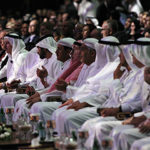With all due respect to the Great Chicago Fire of 1871, Chicago has never burned hotter than right now. Locals have long heralded the city’s many powerhouse industries, educational institutions, cultural attractions, diverse neighborhoods, and sophisticated dining and entertainment options. Now, it seems the rest of the world is waking up to Chicago’s many virtues.
Thanks to a new public-relations strategy initiated by Mayor Rahm Emanuel and spearheaded by Choose Chicago, the city’s newly reorganized tourism bureau, Chicago is gaining in visibility as a global destination. Through regional, national, and international campaigns, the world is getting a second look – and in some cases a first glimpse – at the so-called Second City. Designed to drive the annual number of visitors to 50 million by 2020, the new campaign is promoting Chicago as a leading global destination.
“Chicago is a global city with worldwide appeal,” Emanuel said, “and I am committed to ensuring that people around the world have a chance to experience our magnificent city firsthand.”
Chicago Is a City That Works
With its 26 miles of uninterrupted lakefront, towering skyscrapers, world-renowned museums, and award-winning public spaces and parks, Chicago tops Forbes magazine’s list of America’s Best Downtowns. It is home to more Five-Diamond–rated restaurants than any other city in the United States, and foodies from around the globe make regular pilgrimages to experience this epicurean epicenter. The only U.S. city with five Regional Tony Award–winning theater companies, Chicago delivers show-stopping performances every day of the week.
Beyond the shopping, dining, and entertainment, Chicago is – and always has been – the city that works. With one of the world’s most robust and diversified economies, and a gross regional product of $496 billion (larger than Sweden’s), Chicago is a financial ecosystem all its own. In fact, Chicago was rated “#1 Large U.S. Metro for Economic Diversity” by Moody’s Investor Services. Chicago is home to more than 400 major corporate headquarters, including 29 Fortune 500 companies, and a thriving startup scene. From manufacturing to digital media, derivatives trading to biotech, and transportation to green energy, Chicago integrates mature and emerging industries into one vibrant, uniquely diverse business environment.
Mix in the world-renowned academic and research institutions located there – more than 130 higher-education institutions, including Northwestern University, the University of Chicago, and Illinois Institute of Technology – and the city fairly buzzes with brainpower.
But what truly differentiates Chicago from other global players is its Midwestern accessibility. Emanuel likes to call Chicago the most American of American cities. Because while Chicago has big-city smarts, it’s got a small-town heart; and visitors reap the rewards of a metropolis with an international perspective and a local mindset. Perhaps most important is the chance for a meeting or convention to capture and capitalize on the energy of one of the most vibrant knowledge centers in the world. “Chicago is in a league of its own,” said Don Welsh, president and CEO of Choose Chicago. “There is not a larger stage than this world-class city, and we embrace the mayor’s challenge to spread that message to visitors from every corner of the globe.”
The combination of Chicago’s sophisticated business infrastructure, convenience, and approachability distinguishes the city as an unparalleled setting for business meetings and conventions. Chicago offers access to influential thought leaders and speakers from nearly every industry. Meeting- goers can take off-site visits to leading-edge research facilities and entrepreneurial hotspots, all downtown or within close proximity. The city also provides a built-in attendance base: More than four million people make up its highly skilled and diversified workforce, and of that working population, 2.4 million are within a 50-minute commute of downtown. More than 20 percent of the U.S. population is within a day’s drive.
“The business community here is very involved in the life and fabric of the city,” said Rita Athas, president of World Business Chicago, Chicago’s not-for-profit economic development corporation. “It’s expected when you come into the city that you will be involved.”
“The benefits of hosting an event in Chicago go well beyond the capacity and amenities of the nation’s largest convention center,” said David Causton, general manager of McCormick Place. “Our customers also have the benefit of tapping into a diverse urban infrastructure that spans many industries, including health care, technology, and manufacturing. Coupled with a central location and a major media market, McCormick Place offers an impressive industry reach that extends to a regional, national, and international audience.”
Chicago Is Global
For a metropolis that’s smack in the middle of the country, Chicago has a broad international reach and pull. That’s no coincidence, because the city has made a concerted effort to attract global business and travelers. In 2011, the city welcomed 1.2 million international visitors, and more than 1,500 foreign-based companies currently do business in Chicago. Meanwhile, Chicago-based companies maintain more than 4,500 locations in more than 150 countries.
Chicago is truly a world marketplace, with global exports – led by medical and optical instruments, industrial machinery, and pharmaceutical products – totaling $37 billion in 2011. And imports, including electric machinery, industrial machinery, and mineral fuel, totaled $140 billion.
The city maintains its draw as a top global destination because it’s so easy for international visitors to get there. With two international airports and 2,900 daily nonstop or direct flights to more than 200 cities worldwide, overseas visitors can get to Chicago with minimal hassles and layovers. And once they arrive, the city helps make the experience as enjoyable as possible with a variety of international resources, including 79 consulates or consuls general, more than 40 international/ethnic chambers of commerce, and more than 90 foreign-based trade organizations.
To cement Chicago’s reputation as the premier destination for international visitors, Choose Chicago launched an aggressive global marketing campaign. The city opened representation offices in several international cities as part of the mayor’s goal of ranking among the top five cities in the United States for volume of international visitors. “I am dedicated to dramatically increasing the number of visitors to Chicago,” Emanuel said, “and fostering economic development and job growth throughout the city as a result of these efforts.”
The mayor is far from alone in that campaign. “Chicago’s continued expansion of international offices will bring the necessary forces to bear to reach Mayor Emanuel’s ambitious goal of 50 million visitors by 2020,” Welsh said. “The overwhelming positive response to our global effort clearly shows that a well-developed and flawlessly executed strategy drives increased visitor spending and the new tax revenues.”
Chicago Is Innovation
When people think of Chicago, they often think of a solid city that gets the job done. Chicago built the first skyscraper – the Home Insurance Building, in 1884 – and reversed the flow of a river, after all. (That was the Chicago River, in 1900; a hundred years later, the American Society of Civil Engineers proclaimed the project a “Monument of the Millennium.”) What people might underestimate is the nimble, entrepreneurial mindset that fueled those achievements and drives today’s thriving startup scene.
“Chicago has become one of the nation’s top cities for tech entrepreneurship. Entrepreneurs can find everything they need to succeed: world-class talent, a dynamic community, and a natural base of Fortune 500 customers,” said J.B. Pritzker, founder and managing partner of The Pritzker Group, and founder of New World Ventures, one of Chicago’s leading venture-capital firms. “We’re seeing new startups form practically every day, and entrepreneurs are increasingly moving here to build their businesses.”
Chicago’s tech scene garnered big headlines in 2011 when Groupon, the homegrown daily-deal website, raised $700 million in its initial public offering. But Chicago’s tech community is much deeper than Groupon, with city advocates quick to remind people that Orbitz, GrubHub, CareerBuilder, Sitter- City, and Navteq are all Chicago products.
And those are just the old-timers. According to Built In Chicago, a social-networking platform that works to promote and connect the city’s digital entrepreneurs, 128 web-based startups launched in Chicago last year. That’s one every 72 hours. The innovators behind those startups aren’t just slackers living in their parents’ basements, either, as evidenced by the strong venture-capital activity in Chicago. In 2011, 77 digital technology companies raised $1.45 billion – 431 percent more than in 2010. “Chicago has a strong community of digital tech entrepreneurs who are always willing to provide advice and lend a helping hand,” said Matt Moog, founder and CEO of Viewpoints.com and chair of Built In Chicago. “We have a strong eco-system of educational, corporate, and civic institutions who work together to provide talent, ideas, and capital to fuel a growing technology community.”
Chicago Is Breakthrough Discoveries
Medical and scientific meetings have a long tradition in Chicago, which hosts 17 of the 25 largest such conferences in the United States on a regular, rotating schedule. This is no surprise. With a concentration of medical research centers, global pharmaceutical and life-sciences headquarters, and U.S. and international medical societies, the Chicago metropolitan area is home to:
- More than 250 corporate R&D facilities
- Three federally funded research centers
- Six medical schools and more than 20 teaching hospitals
- The densest concentration of medical research centers in the United States
- More than 500,000 health-care and life-sciences employees.
“Our leading research universities and national labs, established pharmaceutical industry presence, and emerging biotech community combine for an incredibly deep knowledge base,” said Caralynn Nowinski Chenoweth, M.D., associate vice president for innovation and economic development at the University of Illinois. “Grand challenges in medicine and the life sciences are presented every day – and our experts in the Chicago area are playing significant roles in discovering the solutions.”
Chicago is home to the corporate headquarters of Abbott Laboratories, Baxter International, Takeda, Walgreens, and Hospira. These and other area companies are at the forefront of developments in diagnostics, therapeutics, and medical equipment. Meanwhile, with six area hospitals named to U.S. News & World Report’s Best Hospitals, Chicago is a leader in translational research and patient-care breakthroughs. And throughout the Chicago area, business incubators and innovation centers encourage the growth of biotech, nanotechnology, and science startups.
“As a physician, entrepreneur, and venture capitalist, I’ve experienced Chicago’s research and development community from several angles,” Nowinski Chenoweth said. “The federal research dollars that come into the city, the commitment of the private sector, and the scientific talent and genius at our world-renowned institutions and smaller startups make Chicago a hotbed of discovery.”
Within Reach
- Chicago’s location, Central Time Zone, and nonstop passenger service mean that you can fly from nearly any U.S. city and return on the same business day.
- Less than 10 hours from the major European business centers.
- A nonstop global gateway to more than 60 international and 150 domestic business centers.
SOURCE: World Business Chicago
Labor Reform = Meeting Spaces Like No Other
Chicago boasts the most exhibit and meeting-room space in the Western Hemisphere. McCormick Place, the crown jewel of the city’s meeting facilities, is the largest convention center in the United States, with:
- 2.6 million square feet of exhibit halls
- 173 meeting rooms providing nearly 1.2 million square feet of space
- Assembly seating for 15,000 people
- 4,249-seat Arie Crown Theater
- Easy access and more than 5,000 parking spaces.
Privatization of McCormick Place’s operations, followed by settlements between labor organizations and management, have smoothed over work-rule changes at the convention center and made McCormick Place more exhibitor- and customer-friendly than ever. Most recently, a historic agreement between convention center management and labor organizations representing electrical workers and stage employees will allow union stagehands to complete a type of work previously completed by union electricians.
In response to the reforms and new union agreements, a number of major shows are returning to Chicago or going there for the first time. In June 2012, Reed Exhibitions announced it will bring two new shows to the city – AIBTM: The Americas Meetings & Events Exhibition and BookExpo America – representing $56 million in estimated direct expenditures. “Labor reform has resulted in positive results for our annual customers,” said Don Welsh, president and CEO of Choose Chicago, “and continues to resonate well with current and potential customers.”
And just last month, the Chicago-based American Library Association signed an agreement confirming that Chicago will host its Annual Conference in 2020, 2023, and 2026. “This is great news for our convention industry, and shows that Chicago is the place for large, national organizations to come and do business,” said Mayor Rahm Emanuel. “The reforms at McCormick Place and Navy Pier have attracted more than $3.25 billion in committed shows, and this number continues to grow.”
Sweet Home
Fortune 500 companies headquartered in the Chicago metropolitan area include:
- Abbott Laboratories
- Allstate
- Aon
- The Boeing Company
- Exelon
- Kraft Foods
- McDonald’s
- Motorola
- United Continental Holdings
- Walgreens
Choose Chicago: At Your Fingertips
Choose Chicago’s website (choosechicago.com) offers everything meeting professionals and business travelers need to plan and promote their business meetings – and more. At choosechicago.com, meeting professionals can access experiential content, search for vendors, submit RFPs, and utilize marketing tools to help promote their events.
A 2011 agreement with travel booking engine Orbitz Worldwide brought robust travel-planning services directly to choosechicago.com. At the site, a customized booking engine incorporates Chicago’s vast hotel inventory and allows business travelers to research and book air, car, and attractions in one place.



